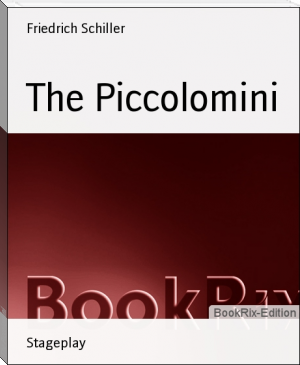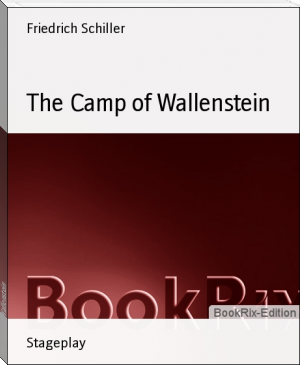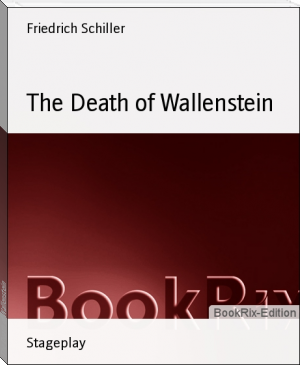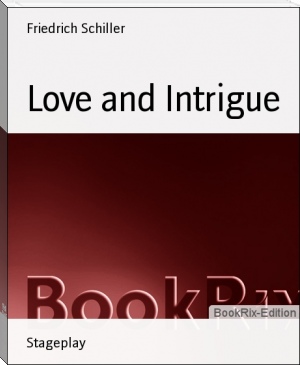The Piccolomini by Friedrich Schiller (summer reads TXT) 📖

- Author: Friedrich Schiller
Book online «The Piccolomini by Friedrich Schiller (summer reads TXT) 📖». Author Friedrich Schiller
MAX. Ay--this state policy! Oh, how I curse it! You will some time, with your state policy, Compel him to the measure: it may happen, Because ye are determined that he is guilty, Guilty ye'll make him. All retreat cut off, You close up every outlet, hem him in Narrower and narrower, till at length ye force him-- Yes, ye, ye force him, in his desperation, To set fire to his prison. Father! father! That never can end well--it cannot--will not! And let it be decided as it may, I see with boding heart the near approach Of an ill-starred, unblest catastrophe. For this great monarch-spirit, if he fall, Will drag a world into the ruin with him. And as a ship that midway on the ocean Takes fire, at once, and with a thunder-burst Explodes, and with itself shoots out its crew In smoke and ruin betwixt sea and heaven! So will he, falling, draw down in his fall All us, who're fixed and mortised to his fortune, Deem of it what thou wilt; but pardon me, That I must bear me on in my own way. All must remain pure betwixt him and me; And, ere the daylight dawns, it must be known Which I must lose--my father or my friend.
[During his exit the curtain drops.
FOOTNOTES.
[1] A town about twelve German miles N.E. of Ulm.
[2] The Dukes in Germany being always reigning powers, their sons and daughters are entitled princes and princesses.
[3] Carinthia.
[4] A town not far from the Mine-mountains, on the high road from Vienna to Prague.
[5] In the original,--
"Den blut'gen Lorbeer geb' ich hin mit Freuden
Fuers erste Veilchen, das der Maerz uns bringt,
Das duerftige Pfand der neuverjuengten Erde."
[6] A reviewer in the Literary Gazette observes that, in these lines, Mr. Coleridge has misapprehended the meaning of the word "Zug," a team, translating it as "Anzug," a suit of clothes. The following version, as a substitute, I propose:--
When from your stables there is brought to me
A team of four most richly harnessed horses.
The term, however, is "Jagd-zug" which may mean a "hunting equipage," or a "hunting stud;" although Hilpert gives only "a team of four horses."
[7] Bernhard of Saxe-Weimar, who succeeded Gustavus in command.
[8] The original is not translatable into English:--
--Und sein Sold
Muss dem Soldaten werden, darnach heisst er.
It might perhaps have been thus rendered:--
And that for which he sold his services,
The soldier must receive--
but a false or doubtful etymology is no more than a dull pun.
[9] In Germany, after honorable addresses have been paid and formally accepted, the lovers are called bride and bridegreoom, even though the marriage should not take place till years afterwards.
[10] I am doubtful whether this be the dedication of the cloister, or the name of one of the city gates, near which it stood. I have translated it in the former sense; but fearful of having made some blunder, I add the original,--
Es ist ein Kloster hier zur Himmelspforte.
[11] No more of talk, where god or angel guest
With man, as with his friend familiar, used
To sit indulgent. Paradise Lost, B. IX.
[12] I found it not in my power to translate this song with literal fidelity preserving at the same time the Alcaic movement, and have therefore added the original, with a prose translation. Some of my readers may be more fortunate.
THEKLA (spielt and singt).
Der Eichwald brauset, die Wolken ziehn,
Das Maegdlein wandelt an Ufers Gruen;
Es bricht sich die Welle mit Macht, mit Macht,
Und sie singt hinaus in die finstre Nacht,
Das Auge von Weinen getruebet:
Das Herz is gestorben, die Welt ist leer,
Und weiter giebt sie dem Wunsche nichts mehr.
Du Heilige, rufe dein Kind zurueck,
Ich babe genossen das irdische Glueck,
Ich babe gelebt and geliebet.
LITERAL TRANSLATION.
THEKLA (plays and sings). The oak-forest bellows, the clouds gather, the damsel walks to and fro on the green of the shore; the wave breaks with might, with might, and she sings out into the dark night, her eye discolored with weeping: the heart is dead, the world is empty, and further gives it nothing more to the wish. Thou Holy One, call thy child home. I have enjoyed the happiness of this world, I have lived and have loved.
I cannot but add here an imitation of this song, with which my friend, Charles Lamb, has favored me, and which appears to me to have caught the happiest manner of our old ballads:--
The clouds are blackening, the storms are threatening,
The cavern doth mutter, the greenwood moan!
Billows are breaking, the damsel's heart aching,
Thus in the dark night she singeth alone,
He eye upward roving:
The world is empty, the heart is dead surely,
In this world plainly all seemeth amiss;
To thy heaven, Holy One, take home thy little one.
I have partaken of all earth's bliss,
Both living and loving.
[13] There are few who will not have taste enough to laugh at the two concluding lines of this soliloquy: and still fewer, I would fain hope, who would not have been more disposed to shudder, had I given a faithful translation. For the readers of German I have added the original:--
Blind-wuethend schleudert selbst der Gott der Freude
Den Pechkranz in das brennende Gebaeude.
Imprint
Publication Date: 05-21-2008
All Rights Reserved
 In literature a drama genre deserves your attention. Dramas are usually called plays. Every person is made up of two parts: good and evil. Due to life circumstances, the human reveals one or another side of his nature. In drama we can see the full range of emotions : it can be love, jealousy, hatred, fear, etc. The best drama books are full of dialogue. This type of drama is one of the oldest forms of storytelling and has existed almost since the beginning of humanity. Drama genre - these are events that involve a lot of people. People most often suffer in this genre, because they are selfish. People always think to themselves first, they want have a benefit.
In literature a drama genre deserves your attention. Dramas are usually called plays. Every person is made up of two parts: good and evil. Due to life circumstances, the human reveals one or another side of his nature. In drama we can see the full range of emotions : it can be love, jealousy, hatred, fear, etc. The best drama books are full of dialogue. This type of drama is one of the oldest forms of storytelling and has existed almost since the beginning of humanity. Drama genre - these are events that involve a lot of people. People most often suffer in this genre, because they are selfish. People always think to themselves first, they want have a benefit.




Comments (0)